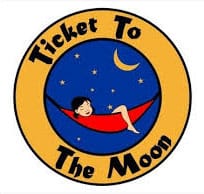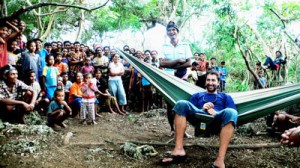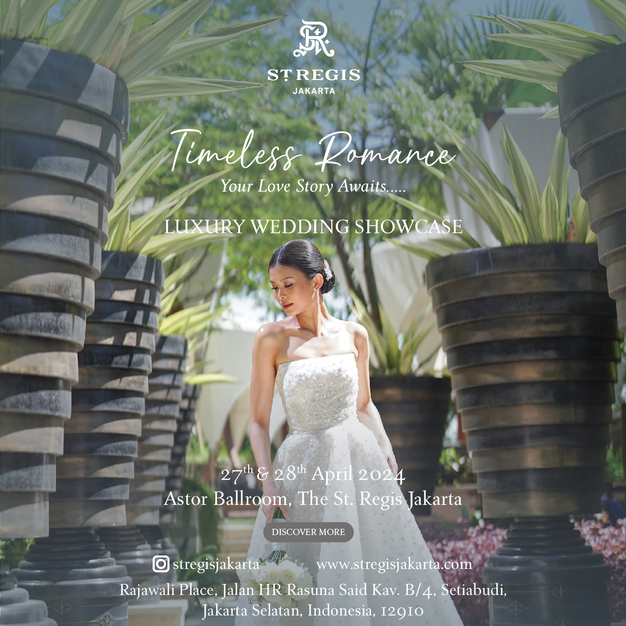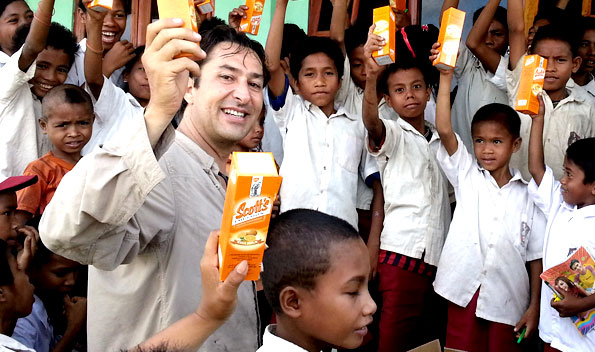Meet Charles Antoine Descotis, CEO and Founder of Ticket to the Moon, which supports Yayasan Lestari.
How did your business evolve in Bali?
I came to Bali in 1996. My plan was to buy some stuff and sell in the markets in Europe. At this time everyone was doing sarongs and typical Bali clothes or jewellery. I wanted to do something different. In India we made our own hammocks by tying knots at the corners of fabric. I found this parachute nylon fabric made in Indonesia which was perfect to make hammocks. The hammocks fold up small enough to fit into pocket size bags; they are elastic and very strong.
So, I started selling them in European markets and at music festivals. It was more for the travelling lifestyle than to start a company. Other travellers were inspired and they asked for more product at wholesale so they share the product which is part of this lifestyle. Before Ticket to the Moon became a company, it was more like a business tribe. Later, I got big orders from large companies and retailers. I set up a factory and started to export the products. I left Europe to be totally free and just to travel where I wanted, and I ended up back in the system! I couldn’t say no because this was helping many people besides myself and it is a good product. You can be anywhere and hang up a hammock to sleep.
What other products do you offer?
We sell mosquito nets, hanging chairs, baby hammocks, eco bags, mini back packs; products made with the concept of travelling light. We are the world leader on the travel hammock, and we inspire many other brands who copy this concept.
 What makes Ticket to the Moon unique?
What makes Ticket to the Moon unique?
The main factor is the quality and strength of the Indonesian-produced fabric which is strong, durable, breathable light fabric; perfect to make comfortable hammocks. Everything is made on our premises in the factory. In sixteen years I have never fired anyone. Today I have 100 people working for Ticket to the Moon. Some of these people started with me in a bungalow, cutting and sewing. I trust them; we have mutual trust. I do not even try to have total control. We all work together and make and market a successful product. This is less stress on me. For sure I could make more profit if I ran things differently, but this way they are happy and I am happy. And I have more free time to give to other interests.
How did the Lestari Mandorak Foundation start?
When I flew over Sumba on my way to Timor I saw an aqua blue lagoon in the middle of the island. It was so beautiful that I went to Sumba to discover where this lagoon was. It took two days on horseback to get there. The inland lagoon is actually sea water with coral and sea life, like a small ocean surrounded by a small island. On the way to the lagoon I discovered a beautiful beach where the foundation is now based in a traditional building we had built. I started to go to Sumba often to camp with friends in the pristine nature. I met the chief of the tribe who married me to the land and I gave him five buffalo. In the beginning it was a place for me and my friends to go and enjoy. Then I realized how different life was for them; with malaria and dengue, no water, no roads, or education. The Kodi tribe was struggling to survive on subsistence agriculture and fishing. Bit by bit our projects, which we initiated to help the local people of the Kodi tribe, became what is now the foundation.
What are some of the achievements of the foundation?
Since 2006 we are a relief project located in West Sumba; Kodi tribe country on the west side of the remote island of Sumba. Friends and I teamed up with local partners to help the Kodi people improve their life conditions while preserving their ancestral culture. We built roads to facilitate trade and connect Kodi with the rest of Sumba. We accessed water by digging wells and created a school to teach Bahasa to children. We give malaria screenings and provide mosquito nets to fight this plague. We educate the people to preserve their culture and their original lands in Sumba. Fishing nets are provided to avoid bomb fishing, which destroys the ocean bed. A traditional Kodi house was built as our headquarters to perpetuate their ancestral traditions and encourage unique crafts, horse games and harness-making, traditional dugout boats, and the ikat weavings. We teach waste management to avoid pollution and we help the Kodi people access clean water, food and healthcare. The people are beautiful and friendly. They are so appreciative of these simple, basic programs we are able to provide and they work hard with us to achieve our mutual goals.
 How can people help this cause?
How can people help this cause?
I invite people to the lodge camp. I hope when people see the natural beauty of West Sumba and the wonderful people there that they will also be inspired to help. We need people with knowledge such as doctors, builders and teachers. We need people of compassion with creative vision. There are so many yayasans in Bali doing a great job, but there is great need in the eastern Indonesian islands where people live such hard lives. The disparity between these islands and Bali is huge. In the East of Bali there is poverty, but there is always food. I have a wonderful relationship with the people I work with through the foundation. I am helping where I found the greatest need. The work I do with the foundation motivates me to keep developing Ticket to the Moon.
Imagine a world where all corporations were socially responsible! Thank you, Charlie!
Ticket to the Moon [For Dreamers Worldwide]
www.ticketothemoon.com
Yayasan Lestari Mandorak Foundation
www.mandorak.org





